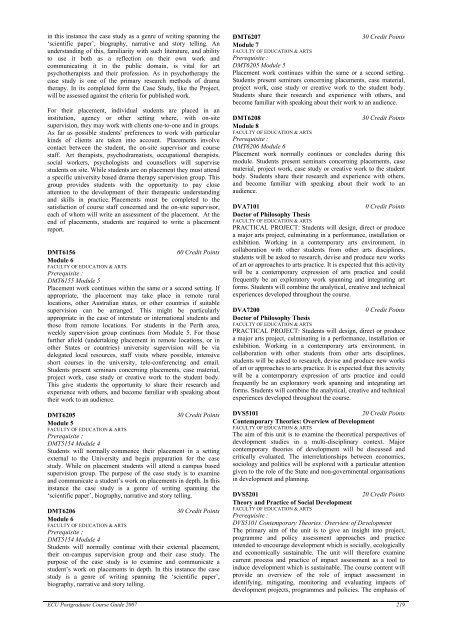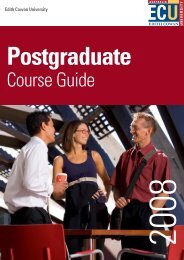Course Guide - Edith Cowan University
Course Guide - Edith Cowan University
Course Guide - Edith Cowan University
You also want an ePaper? Increase the reach of your titles
YUMPU automatically turns print PDFs into web optimized ePapers that Google loves.
in this instance the case study as a genre of writing spanning the<br />
‘scientific paper’, biography, narrative and story telling. An<br />
understanding of this, familiarity with such literature, and ability<br />
to use it both as a reflection on their own work and<br />
communicating it in the public domain, is vital for art<br />
psychotherapists and their profession. As in psychotherapy the<br />
case study is one of the primary research methods of drama<br />
therapy. In its completed form the Case Study, like the Project,<br />
will be assessed against the criteria for published work.<br />
For their placement, individual students are placed in an<br />
institution, agency or other setting where, with on-site<br />
supervision, they may work with clients one-to-one and in groups.<br />
As far as possible students' preferences to work with particular<br />
kinds of clients are taken into account. Placements involve<br />
contact between the student, the on-site supervisor and course<br />
staff. Art therapists, psychodramatists, occupational therapists,<br />
social workers, psychologists and counsellors will supervise<br />
students on site. While students are on placement they must attend<br />
a specific university based drama therapy supervision group. This<br />
group provides students with the opportunity to pay close<br />
attention to the development of their therapeutic understanding<br />
and skills in practice. Placements must be completed to the<br />
satisfaction of course staff concerned and the on-site supervisor,<br />
each of whom will write an assessment of the placement. At the<br />
end of placements, students are required to write a placement<br />
report.<br />
DMT6156<br />
60 Credit Points<br />
Module 6<br />
FACULTY OF EDUCATION & ARTS<br />
Prerequisite :<br />
DMT6155 Module 5<br />
Placement work continues within the same or a second setting. If<br />
appropriate, the placement may take place in remote rural<br />
locations, other Australian states, or other countries if suitable<br />
supervision can be arranged. This might be particularly<br />
appropriate in the case of interstate or international students and<br />
those from remote locations. For students in the Perth area,<br />
weekly supervision group continues from Module 5. For those<br />
further afield (undertaking placement in remote locations, or in<br />
other States or countries) university supervision will be via<br />
delegated local resources, staff visits where possible, intensive<br />
short courses in the university, tele-conferencing and email.<br />
Students present seminars concerning placements, case material,<br />
project work, case study or creative work to the student body.<br />
This give students the opportunity to share their research and<br />
experience with others, and become familiar with speaking about<br />
their work to an audience.<br />
DMT6205<br />
30 Credit Points<br />
Module 5<br />
FACULTY OF EDUCATION & ARTS<br />
Prerequisite :<br />
DMT5154 Module 4<br />
Students will normally commence their placement in a setting<br />
external to the <strong>University</strong> and begin preparation for the case<br />
study. While on placement students will attend a campus based<br />
supervision group. The purpose of the case study is to examine<br />
and communicate a student’s work on placements in depth. In this<br />
instance the case study is a genre of writing spanning the<br />
‘scientific paper’, biography, narrative and story telling.<br />
DMT6206<br />
30 Credit Points<br />
Module 6<br />
FACULTY OF EDUCATION & ARTS<br />
Prerequisite :<br />
DMT5154 Module 4<br />
Students will normally continue with their external placement,<br />
their on-campus supervision group and their case study. The<br />
purpose of the case study is to examine and communicate a<br />
student’s work on placements in depth. In this instance the case<br />
study is a genre of writing spanning the ‘scientific paper’,<br />
biography, narrative and story telling.<br />
DMT6207<br />
30 Credit Points<br />
Module 7<br />
FACULTY OF EDUCATION & ARTS<br />
Prerequisite :<br />
DMT6205 Module 5<br />
Placement work continues within the same or a second setting.<br />
Students present seminars concerning placements, case material,<br />
project work, case study or creative work to the student body.<br />
Students share their research and experience with others, and<br />
become familiar with speaking about their work to an audience.<br />
DMT6208<br />
30 Credit Points<br />
Module 8<br />
FACULTY OF EDUCATION & ARTS<br />
Prerequisite :<br />
DMT6206 Module 6<br />
Placement work normally continues or concludes during this<br />
module. Students present seminars concerning placements, case<br />
material, project work, case study or creative work to the student<br />
body. Students share their research and experience with others,<br />
and become familiar with speaking about their work to an<br />
audience.<br />
DVA7101<br />
0 Credit Points<br />
Doctor of Philosophy Thesis<br />
FACULTY OF EDUCATION & ARTS<br />
PRACTICAL PROJECT: Students will design, direct or produce<br />
a major arts project, culminating in a performance, installation or<br />
exhibition. Working in a contemporary arts environment, in<br />
collaboration with other students from other arts disciplines,<br />
students will be asked to research, devise and produce new works<br />
of art or approaches to arts practice. It is expected that this activity<br />
will be a contemporary expression of arts practice and could<br />
frequently be an exploratory work spanning and integrating art<br />
forms. Students will combine the analytical, creative and technical<br />
experiences developed throughout the course.<br />
DVA7200<br />
0 Credit Points<br />
Doctor of Philosophy Thesis<br />
FACULTY OF EDUCATION & ARTS<br />
PRACTICAL PROJECT: Students will design, direct or produce<br />
a major arts project, culminating in a performance, installation or<br />
exhibition. Working in a contemporary arts environment, in<br />
collaboration with other students from other arts disciplines,<br />
students will be asked to research, devise and produce new works<br />
of art or approaches to arts practice. It is expected that this activity<br />
will be a contemporary expression of arts practice and could<br />
frequently be an exploratory work spanning and integrating art<br />
forms. Students will combine the analytical, creative and technical<br />
experiences developed throughout the course.<br />
DVS5101<br />
20 Credit Points<br />
Contemporary Theories: Overview of Development<br />
FACULTY OF EDUCATION & ARTS<br />
The aim of this unit is to examine the theoretical perspectives of<br />
development studies in a multi-disciplinary context. Major<br />
contemporary theories of development will be discussed and<br />
critically evaluated. The interrelationships between economics,<br />
sociology and politics will be explored with a particular attention<br />
given to the role of the State and non-governmental organisations<br />
in development and planning.<br />
DVS5201<br />
20 Credit Points<br />
Theory and Practice of Social Development<br />
FACULTY OF EDUCATION & ARTS<br />
Prerequisite :<br />
DVS5101 Contemporary Theories: Overview of Development<br />
The primary aim of the unit is to give an insight into project,<br />
programme and policy assessment approaches and practice<br />
intended to encourage development which is socially, ecologically<br />
and economically sustainable. The unit will therefore examine<br />
current process and practice of impact assessment as a tool to<br />
induce development which is sustainable. The course content will<br />
provide an overview of the role of impact assessment in<br />
identifying, mitigating, monitoring and evaluating impacts of<br />
development projects, programmes and policies. The emphasis of<br />
ECU Postgraduate <strong>Course</strong> <strong>Guide</strong> 2007 219



